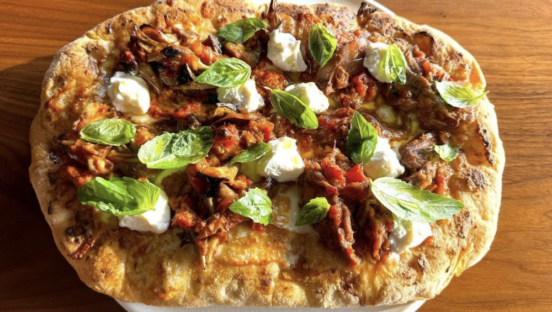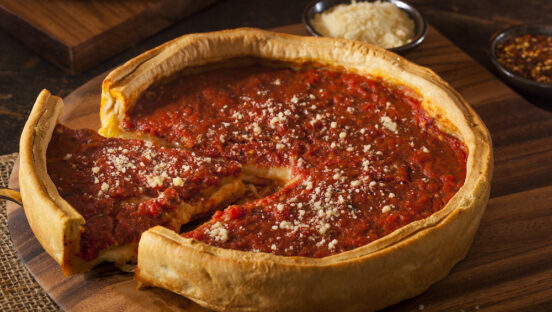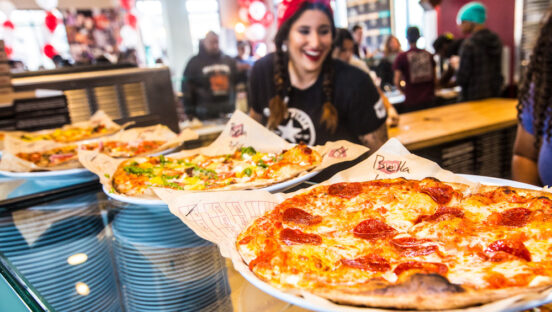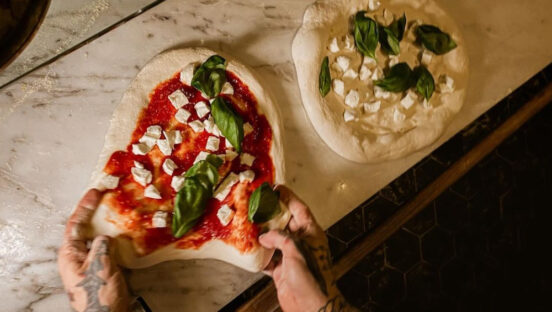On the cusp of opening his first franchise after 10 years in business and five company-owned stores in Wisconsin, Brewer Stouffer, founder and owner of Wisconsin-based The Roman Candle, has a pretty busy schedule these days. But he still took the time to talk to PMQ about what makes his pizzeria unique and how he hopes to bring his love for local ingredients and the community to the rest of the country.
PMQ: How would you describe The Roman Candle to someone who Has never Eaten there Before?
Stouffer: We’re an East Coast-style pizzeria that features open kitchens and a hand-tossed pizza that uses a lot of farm-fresh ingredients. We’re very proud of our dough, which takes us 36 hours to make from scratch. We press out and hand-toss every pizza to order.
PMQ: Who is your typical customer?
Stouffer: Primarily, our full-time customer would be a middle-class to upper-middle-class family where mom either works or stays home with the kids and cares about the food she feeds the kids. That’s kind of our bulls-eye demographic. Secondly, it would be young professionals. We have a lot of craft beers on tap and wines by the glass; we offer delivery and takeout, and we have advanced online ordering capabilities. I wouldn’t say we’re expensive, but we’re definitely not competing with $5.99 pizza.
PMQ: Where did the name The Roman Candle originate?
Stouffer: At the time, I was making commercials and rock videos, and that’s how I made my daily bread. I was shooting a video for a band, and we were playing with a lot of fireworks. As I was transitioning into this next phase of my life, those fireworks were going off at night in slow motion, juxtaposed with the pizza enterprise, and the name just exploded quite literally into the collective imagination of the people I was building the store with at the time. It’s also vaguely Italian and playful. It was obvious from the beginning that, with a name like The Roman Candle, your brand could have a fun and retro feel with firework iconography. We have a very playful, yet refined, brand.
PMQ: How did you go from producing rock videos to making pizza?
Stouffer: I’ve always been interested in setting the stage. I never thought I’d own a restaurant, but I’ve always been a people person. I loved going out to eat and always loved pizza. I saw a need for a sit-down, family-friendly pizzeria in the neighborhood where I was spending a lot of time. We now have five locations and we’re starting to franchise. It’s been an amazing ride.
PMQ: What have been some of your most popular promotions?
Stouffer: Our entire marketing focus is local and on the community. We do things that are great for our neighbors. We have a saying, “Good neighbors make great pizza,” and we really believe that. Over time, we’ve invested in the neighborhood schools, community centers, fun runs, cleanup efforts, etc. We’ve always donated to good causes and tried to sponsor events whenever we can. I’ve slowly realized that investing in our community has become our marketing plan. It’s one of the foundations of our brand. We’ve formalized it now, and we do what’s called Community Days, where we partner with a local school or nonprofit organization and they send out emails and social media posts saying to come to The Roman Candle and the organization will get a portion of the proceeds.
PMQ: When do you hold Community Days, and how successful have they been?
Stouffer: We usually hold Community Days on a Monday, Tuesday or Wednesday, which are slower nights. It’s a great way to introduce your brand to new people and to give back to your neighbors. Through Community Days and other direct donations, we were able to give back more than $50,000 this past year alone through more than 50 unique events.
 |
|
The Roman Candle was able to give back more than $50,000 through Community Days and direct donations last year. |
PMQ: In what other ways are you reaching out to the community?
Stouffer: We also provide a Good Neighbor Discount to all first responders, veterans, active service members and teachers every day, not just on special holidays. We try to actively promote the discount and train our staff to recognize someone in uniform. Or if someone mentions something about a school, our staff will ask them if they know about the Good Neighbor Discount.
PMQ: Tell us about the Candle Club.
Stouffer: We have thousands of members in our Candle Club, who receive email offers ranging from our “Day After” special, which is a discount after a major holiday, to online-only specials and flash sales. We use Constant Contact and email to tell members about current offers, upcoming Community Days and other things we’re doing. Over the past two years, we’ve figured out that emailing once or twice a week is the ideal frequency to achieve the fewest opt-outs and best offer redemption rates.
PMQ: What is Monday Funday?
Stouffer: On Mondays during the winter we offer a BOGO half-off-anything deal where you buy one of anything at full price and get anything else on the menu for half-price. It’s just a way to get people to dine in on Mondays. We definitely see a bump in sales from running the promo, but it’s still hard to change human nature. It’s hard to get people to come out on a Monday in January. So we still do the most promotions for Friday and Saturday nights, which are our busiest. People naturally want to eat out on those nights, and no matter what you do to pretty up Mondays, it will always be hard to get people in on that day. That’s why we enjoy hosting our Community Days on Mondays and Tuesdays, so we can help the community during those slow times.
PMQ: How has online ordering helped you learn more about your customers?
Stouffer: We’ve been offering online ordering for almost four years. At the time we started it, there weren’t a lot of people doing it, and it was a differentiator for us. Online ordering accounted for about 1% of our sales in 2012. Now, online orders account for a shocking 30% of our delivery and takeout sales. Increasingly, those orders are placed on mobile phones.
Over the past four years, our sales have gone up, but our sales mix has changed. Our dine-in has gone down a little bit, and our delivery stayed the same. What has gone up is our takeout. So what we’re noticing is that people still want to come to the store. They don’t mind parking and getting out of the car. But they like to walk in, maybe grab a beer, and pick up their food on their time. So we’ve been working on ways to incentivize people to either pick up their orders when it’s not so busy or grab a beer while they wait.
PMQ: What’s your take on couponing?
Stouffer: It’s kind of a catch-22 if you’re a premium brand that delivers because people want offers and deals, but we can’t discount our product too heavily. The food cost of one of our specialty pizzas is probably triple that of low-cost pizzas out there. But if you deliver, you have to offer coupons. It’s a double-edged sword. We are a premium product—we know the creamery where our cheese comes from, our sausage is ground fresh to our specifications, and we know the farmer who grows our basil. If we didn’t offer delivery and takeout, we probably wouldn’t do a lot of offers and discounts, but we have to play that game because we deliver. So anytime we make an offer, we try to make it a value proposition such as “a large for the price of a medium,” or “a free order of breadsticks when you order a pizza and a 2-liter,” as opposed to everything being half off. You’re still rewarding the customer for buying your product, but you aren’t telling them that, if they wait until tomorrow, they can get it for cheaper.
 |
|
The Roman Candle has a generous free food policy for its staff, which helps them become more knowledgeable and passionate about the food. |
PMQ: Why do you feel it’s important to feed your staff well?
Stouffer: We have a very generous food policy with our employees. Whenever someone works, they can have whatever they want, from fresh salads to the slice of the day. From a marketing prospective, it’s wonderful that you share your food with your staff because you want your staff to be knowledgeable and passionate about your food and be able to recommend their favorites to your customers. I also ask staff regularly about their favorite pizzas—both to eat and sell—and remind them about what makes our menu special so they can relay that info to our customers.
PMQ: Do you use social media for marketing?
Stouffer: We keep up our Facebook, Twitter and Instagram accounts, but I feel like it’s mostly pay-to-play now. We do our best to have meaningful, interesting content, but we boost certain posts to bring more attention to them. We follow the metrics and see what works and how we can do better next time.
PMQ: After 10 years, why franchise The Roman Candle now?
Stouffer: I’m franchising so I can grow The Roman Candle and keep it local. I have a real passion for pure food and local food. Franchising is allowing me to share that passion with other communities. When we opened our fourth store in Milwaukee, it was a challenge because I didn’t know the school districts or the community. Through franchising, each store will be able to focus on its own local community. Every one of our current stores reflects the community around it, and that’s the ultimate plan for our franchises.
PMQ: What’s your advice for those who may be struggling with their marketing?
Stouffer: You don’t have to live and die marketing, but you need to do what feels right to you and come to terms with the fact that you have to market. There’s a lot of competition out there, especially for pizza. You have to let people know what you do. We found out that we love getting involved with the community; that’s our thing. Other pizzerias may find that they like holding pizza eating contests. What’s exciting? What sounds fun to you? How do you think you can get your product into more people’s hands? If you keep asking yourself that question and keep trying different things, you’ll figure out what works for your personality and the culture of your pizzeria.















